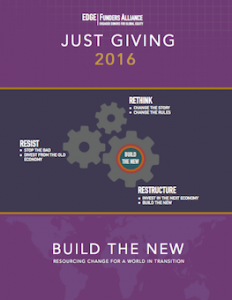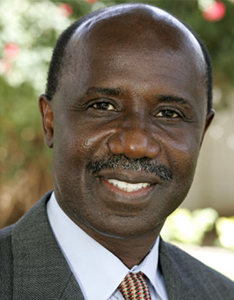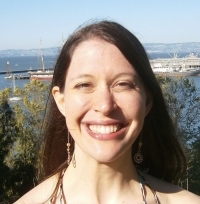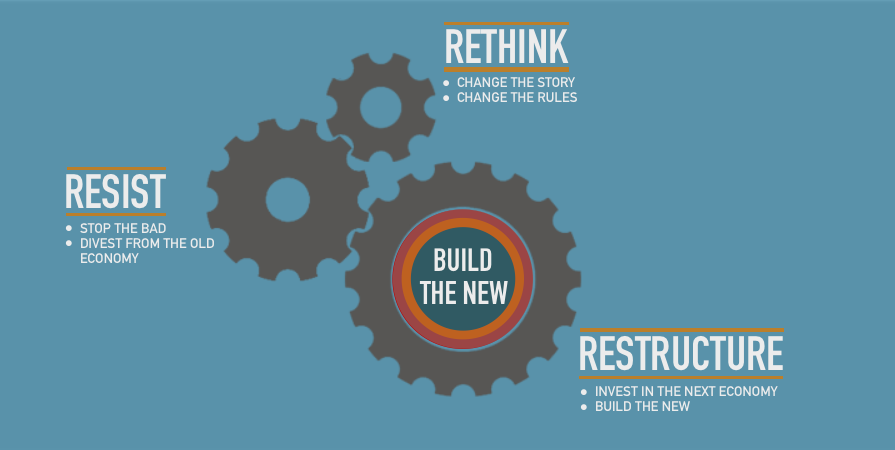
Can philanthropy recognize and address the systemic nature of the multifaceted crises we face? Can those of us working within a field made possible through a concentration of wealth and power use our resources to support structural reforms that can lead to deep democracy, a sustainable future and economic justice for all?
In April, 2016, The Just Giving Conference brought together 250+ donors, funders and civil society allies to address these questions, deepen our collective understanding of the interconnected nature of today’s challenges, and lift up emerging intersectional strategies for social and economic transformation. In place of traditional workshops we convened daily within seven thematic “Engagement Labs,” allowing for deeper conversations and opportunities to share information, insights and strategies across the funder/grantee divide. Together we asked what long term systemic change looks like within our collective areas of interest, and what key insights, recommendations and new institutional and individual practice we wanted take forward within our wider communities. These efforts, framed as a transition from an “extractive” to a more social, living economy, will continue, as collectively we work to encourage and strengthen donor initiatives, affinity groups and collaboratives moving resources to deep, longterm structural change.
Less a conference than a facilitated retreat, the 2016 gathering encouraged the active and full engagement of all participants. Traditional workshops were replaced by ongoing “engagement lab” discussions led by members of the EDGE community, together with many of our most inspiring and thoughtful civil society partners.
Just Giving 2016 was organized to engage, inspire and inform – deepening mutual understanding of just transition narratives and practice. It encouraged us to learn from each other and to be more effective and collaborative at moving resources to key sectors and constituencies working to promote systemic alternatives at the local, national, and international levels.
 Dr. Akwasi Aidoo, is a senior fellow at Humanity United (with the link: https://humanityunited.org/), and serves as chair of the board of the Open Society Initiative for West Africa and the Fund for Global Human Rights. Dr. Aidoo is the former executive director of TrustAfrica, a foundation dedicated to advancing equitable development and democratic governance in Africa. His previous roles include head of Canadian International Development Research Center’s health and equity program for West and Central Africa, head of the Ford Foundation’s office for West Africa, and director of the Ford Foundation’s Special Initiative for Africa. He previously served as a trustee for several international organizations, including OXFAM America and Resource Alliance. In the 1970s and 1980s, Dr. Aidoo taught at universities in Ghana, Tanzania, and the United States. He was educated in Ghana and the United States and received a PhD in medical sociology from the University of Connecticut in 1985. He writes poetry and short stories in his spare time.
Dr. Akwasi Aidoo, is a senior fellow at Humanity United (with the link: https://humanityunited.org/), and serves as chair of the board of the Open Society Initiative for West Africa and the Fund for Global Human Rights. Dr. Aidoo is the former executive director of TrustAfrica, a foundation dedicated to advancing equitable development and democratic governance in Africa. His previous roles include head of Canadian International Development Research Center’s health and equity program for West and Central Africa, head of the Ford Foundation’s office for West Africa, and director of the Ford Foundation’s Special Initiative for Africa. He previously served as a trustee for several international organizations, including OXFAM America and Resource Alliance. In the 1970s and 1980s, Dr. Aidoo taught at universities in Ghana, Tanzania, and the United States. He was educated in Ghana and the United States and received a PhD in medical sociology from the University of Connecticut in 1985. He writes poetry and short stories in his spare time.
 Samantha Harvey is an Environment Program Officer at The Overbrook Foundation, as well as a member of the Internal Support Team for Building Equity and Alignment for Impact (BEA initiative), a grassroots-led initiative designed to reach greater sustained success for the environment and overlapping progressive movement by supporting equitable funding structures and partnerships among grassroots groups, large, national green groups and philanthropy. Through this work, Samantha is also helping to develop a “movement-building” portfolio for the Foundation. She serves on the boards of EDGE Funders Alliance and Center for Diversity and the Environment. Samantha found her environmental calling in the canyons of Utah on a 2002 Outward Bound trip, and went on to earn a Master’s in Journalism through the Center for Environmental Journalism at the University of Colorado. Her first career was as a modern dancer, and she has performed and taught with dance companies internationally and throughout the New York area.
Samantha Harvey is an Environment Program Officer at The Overbrook Foundation, as well as a member of the Internal Support Team for Building Equity and Alignment for Impact (BEA initiative), a grassroots-led initiative designed to reach greater sustained success for the environment and overlapping progressive movement by supporting equitable funding structures and partnerships among grassroots groups, large, national green groups and philanthropy. Through this work, Samantha is also helping to develop a “movement-building” portfolio for the Foundation. She serves on the boards of EDGE Funders Alliance and Center for Diversity and the Environment. Samantha found her environmental calling in the canyons of Utah on a 2002 Outward Bound trip, and went on to earn a Master’s in Journalism through the Center for Environmental Journalism at the University of Colorado. Her first career was as a modern dancer, and she has performed and taught with dance companies internationally and throughout the New York area.
Just Giving 2016 focused on shifting philanthropic resources towards deeper systemic change. To this end Engagement Labs, organized around issues, themes or philanthropic practice, convened throughout the conference to deep engagement in new, emerging or already existing philanthropic strategies and initiatives developed by funders in collaboration with civil society allies.
Instead of a Conference Planning Committee, Engagement Lab Leaders worked with the conference facilitator, Co-Chairs and staff and helped finalize conference structures and objectives, guide conversations and provided input and leadership during our gathering in April.

